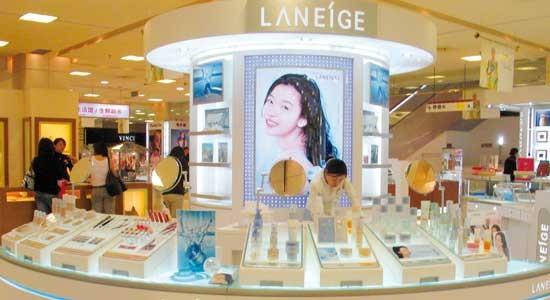
"Xiexie," says a beauty store assistant as she sees out a group of Chinese customers carrying big bags full of cosmetics in South Korea's busy Myongdong commercial district. The shop clerk is not Korean but one of the Aritaum chain's Chinese employees, who make up 40 percent of its Myongdong staff.
"Xiexie," says a beauty store assistant as she sees out a group of Chinese customers carrying big bags full of cosmetics in South Korea's busy Myongdong commercial district. The shop clerk is not Korean but one of the Aritaum chain's Chinese employees, who make up 40 percent of its Myongdong staff.
The stores selling cosmetics made by South Korea's AmorePacific have increased their numbers over recent years and began hiring Chinese clerks in 2009 to woo Chinese customers and beat the competition. Now finding a Chinese-speaking shop attendant in the area is not rare.
"Around 40 percent of shop clerks are Chinese," the company told the Global Times in a statement. More than 70 percent of customers in Aritaum stores are foreigners, 80 percent of whom are Chinese.
However, it's not the increasing number of Chinese customers that is exciting business owners the most, but how much they spend.
Two Chinese tourists put items into a basket. "I want to give some to my friends as gifts," says Huang Xin. She and her friend spent 1,500,000 won ($1,415) in the store.
Biggest spenders
According to recent statistics from Seoul City government, the Chinese are the biggest spenders among the 3 million foreign tourists who visited Seoul during the first five months of this year
In terms of numbers, Japanese tourists are the largest group to visit the city. But Chinese tourists spend more than their Japanese counterparts. While a Japanese tourist spends $1,076, a Chinese tourist spends $1,646. The average tourist spends $1,298.
Shinsegae, South Korea's department store franchise, has been enjoying revenue growth over the past three months, driven by Chinese tourists.
While the total growth revenue from foreigners grew 16 percent in June, revenue from Chinese tourists grew 35 percent.
"We saw an explosive increase in revenue from Chinese customers starting in April," said Jung Hee-won, a marketing representative for the department store.
Chinese-friendly services
More evidence came with the addition of Korean brands to the 10 best selling brands.
"Two of three Korean brands that are popular among Chinese customers entered the top 10 best selling list, which we'd never seen before," Jeong said.
The company boosted services for Chinese VIP customers last month, adding more Chinese-speaking staff and providing gift certificates and even airplane tickets for those who spent more than $2,800.
"Although we can't reveal our internal definition of VIP customers, we apply the same standard to Chinese customers as we do to Korean customers now," Jeong said.
The company opened a VIP lounge for Chinese customers but found financial incentives to be more effective. The department store returns 5 percent of purchases by Chinese customers in the form of gift certificates if the customers use the "UnionPay Platinum Card," in an attempt to attract card holders who pay an annual fee of $660 and spend at least $33,000 a year.
Other department stores in Korea and Japan have all moved quickly to entice Chinese users of UnionPay, the only bankcard organization in China, with different ranges of discounts and by getting more ATMs and stores to accept the cards. In Japan, UnionPay used to be accepted in just 300 stores, a number that has now risen to 20,000.
For both Japan and Korea, attracting Chinese travelers is important for their economies and both countries eased visa restrictions for Chinese tourists last summer.
Japan, which began issuing multiple-entry visas for wealthy Chinese nationals on July 1, is also considering further relaxing conditions to granting visas to individual Chinese visitors in order to boost longer-stay tourism, Japan's Mainichi Daily News reported.
Global hotel chains such as Hilton, Starwood and Marriott are also offering Chinese-friendly services, the Wall Street Journal reported earlier this month.
Hilton, Chinese millionaires' and billionaires' second favorite hotel chain according to the Hurun report, which examines the wealth of rich Chinese, provides Chinese language service, Chinese tea and TV channels dedicated to Chinese programming.
Marriott, ranked seventh, added congee to its breakfast menu.
Tariff concern
The Hurun report found shopping to be the biggest reason for rich Chinese people to travel abroad, with 90 percent of the country's millionaires traveling abroad last year. Demand was driven by yuan appreciation, making international travel cheaper, an easing of visa application processes and the meteoric rise of private wealth.
According to a recent report by the shopping website Global Blue on tax-free shopping in 2010, Chinese travelers' tax-free spending increased by 91 percent year-on-year. They bought luxury products such as clothes, jewelry, watches, cosmetics and fabrics, becoming the world's biggest buyers of tax-free goods.
However, the greater the spending abroad, the more anxious the Chinese government becomes. Ministry of Commerce spokesman Yao Jian last month admitted that the government would reduce import tariffs on middle- and high-end products because it wants to stimulate more domestic consumption.
Chinese people's spending on luxury goods overseas is four times greater than similar spending within China.
Chinese ministries have reportedly reached a general agreement to cut import duties, which currently make prices of luxury goods up to 70 percent more expensive in China than elsewhere. For example, 20 luxury brands of watches, consumer electronics, suitcases and liquor are on average 72 percent more expensive in China than in France, a factor that contributes to Chinese tourists' hefty spending in France.
Even if the import tariff is cut, the overall trend of outbound luxury shopping is unlikely to change due to the explosive increase of the number of Chinese tourists traveling abroad and their growing purchasing power.
"The effect won't be big enough to affect the ongoing trend," said Kim Jinh-yuck, a researcher at the Samsung Research Institute.





